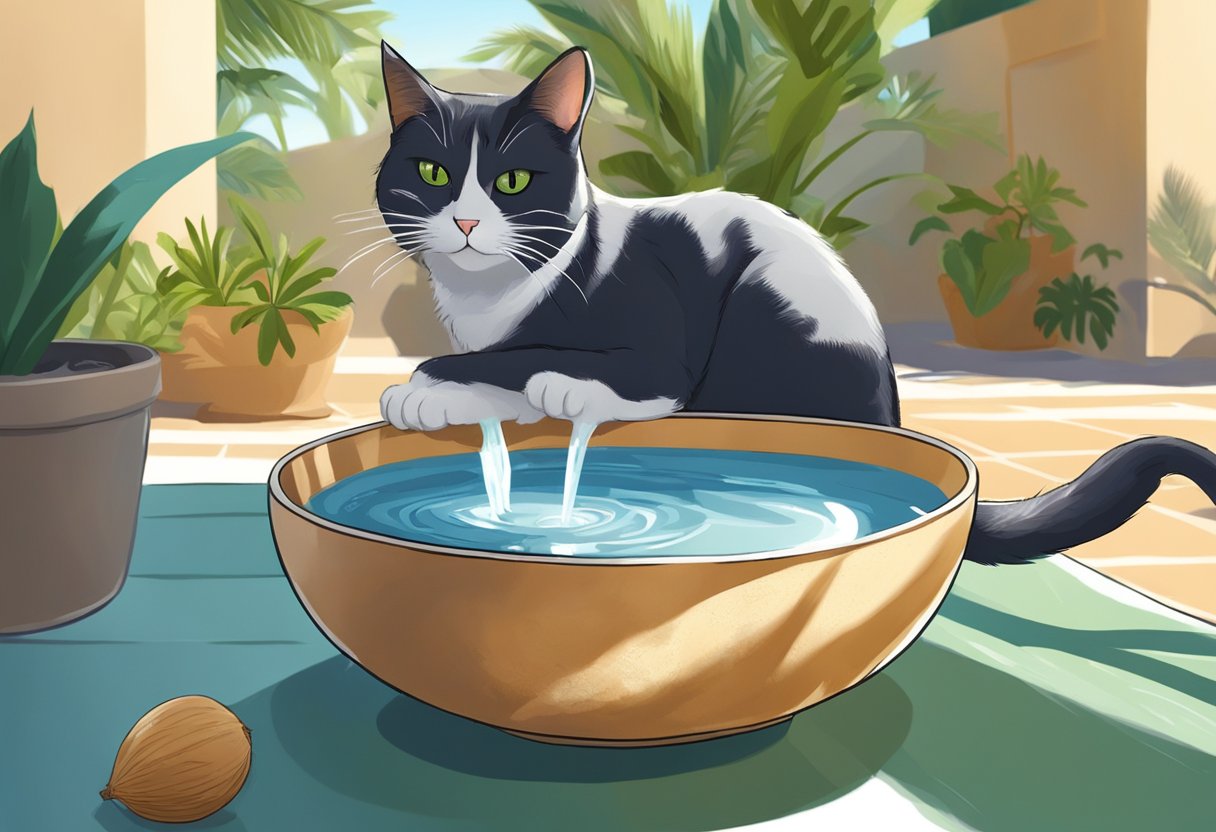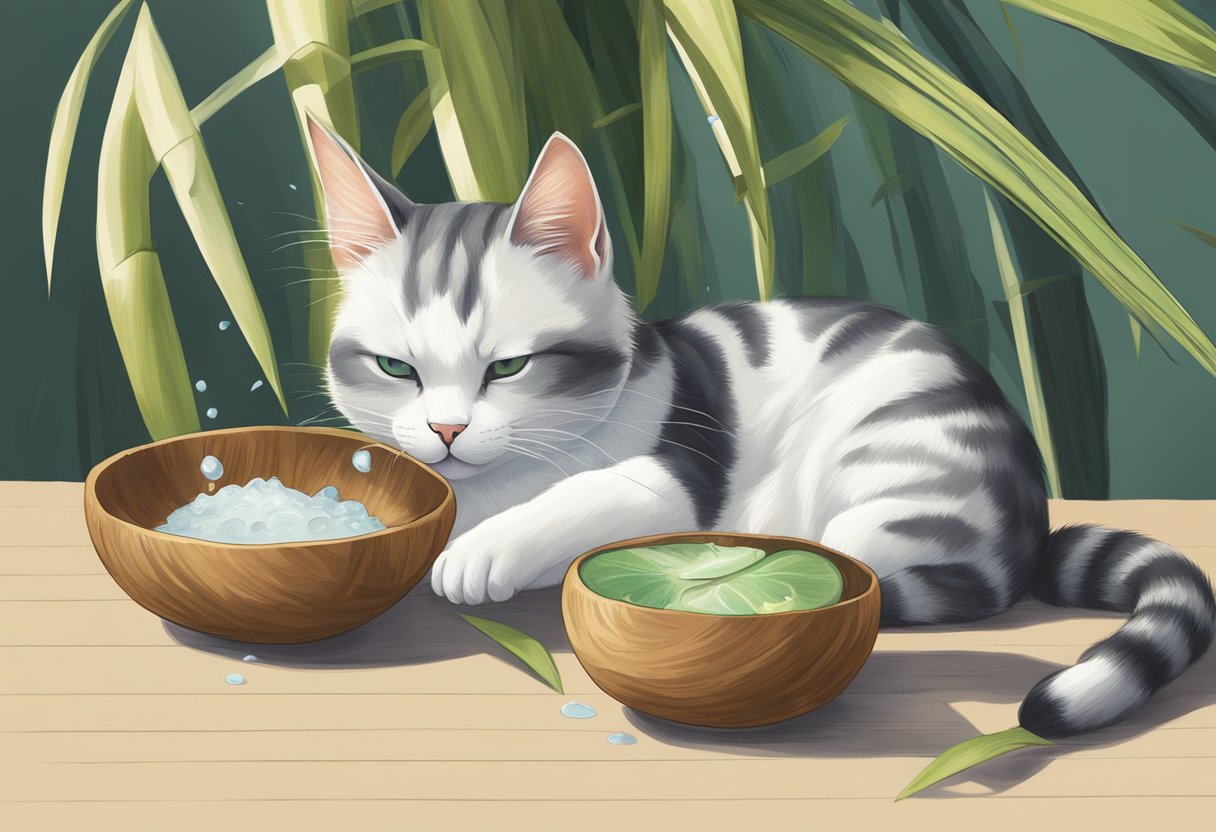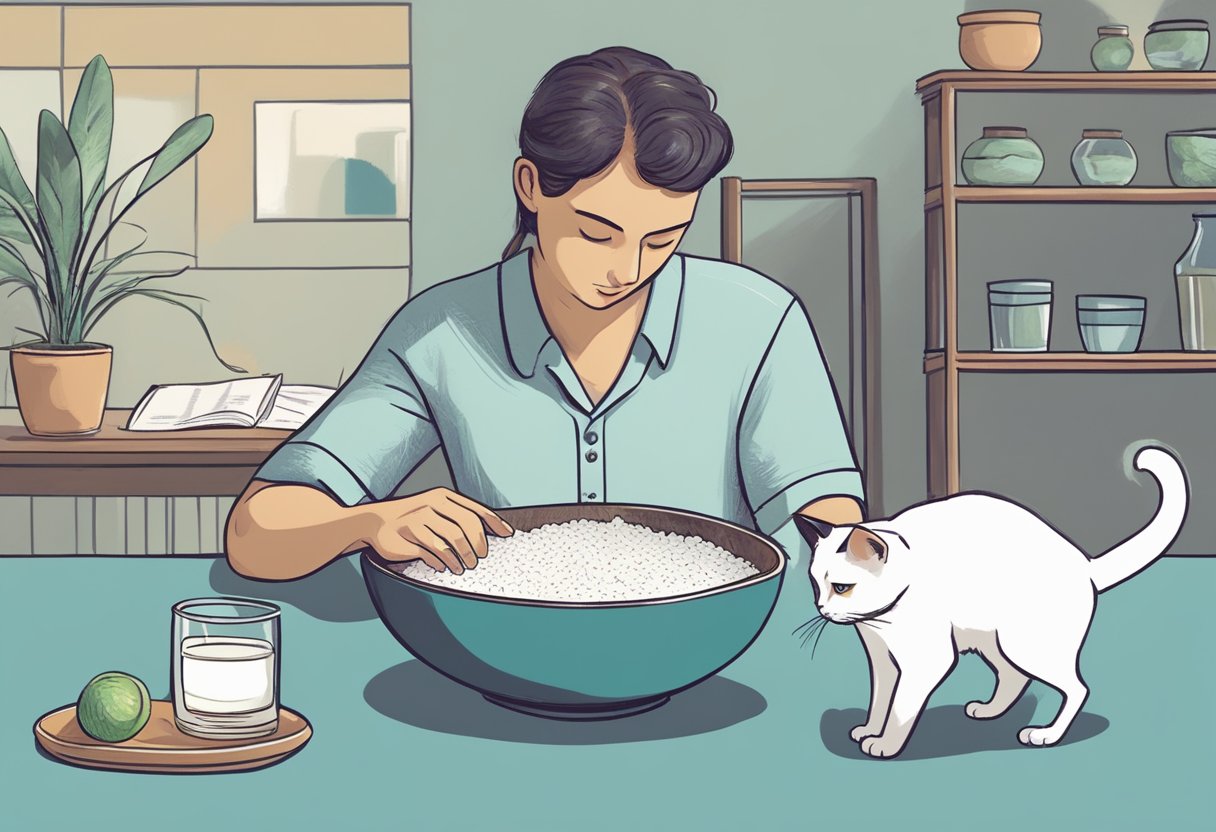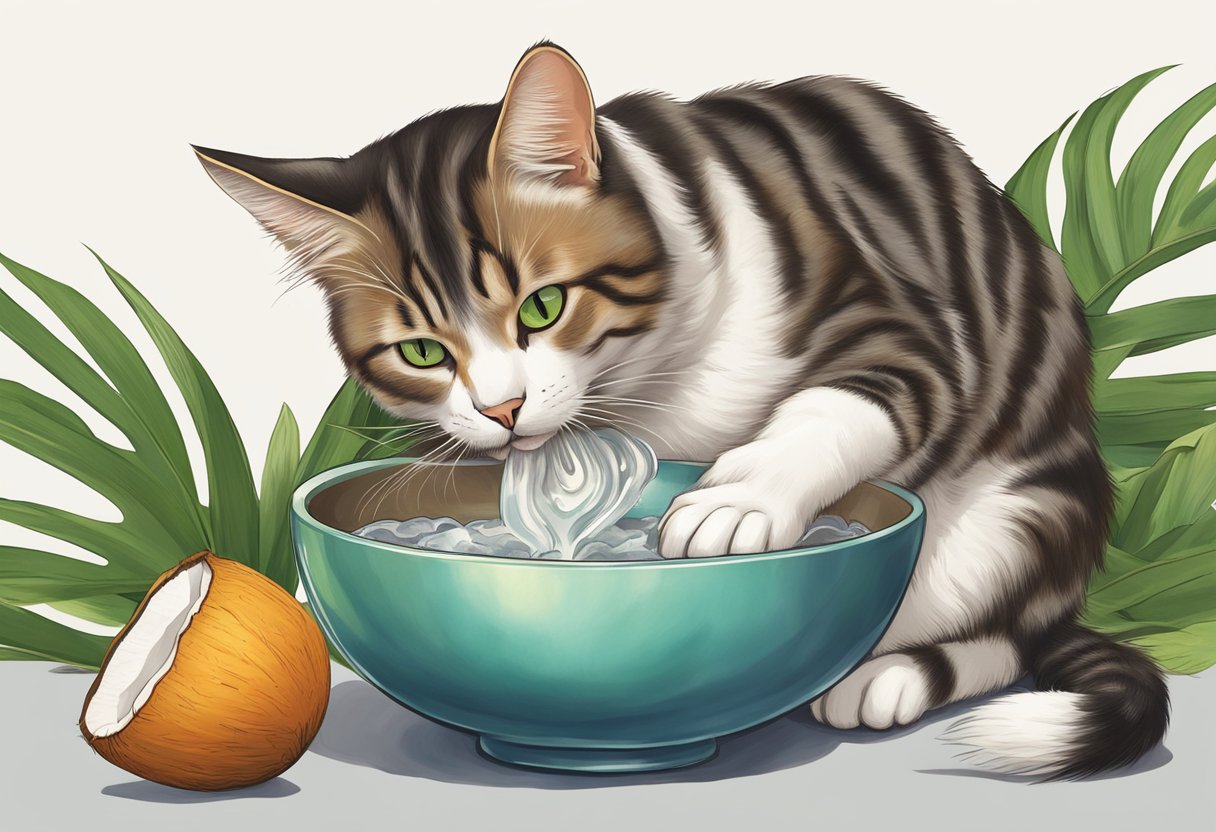As pet owners become more adventurous with their furry friends’ diets, exploring non-traditional foods and drinks, such as coconut water, has become a trend.
Can Cats Have Coconut Water?
The answer is Yes. Coconut water is a natural beverage packed with electrolytes, is a great way to hydrate your pet and charge him with electrolytes, which can protect your pet from renal failures.
Understanding its implications for cats, especially for a cat owner with kidney disease, is crucial.

While coconut water is not toxic to cats, this does not necessarily mean it’s a beneficial addition to their diet.
Your cat’s hydration should primarily come from clean, fresh water.
You may query, is coconut water a safe and beneficial addition to your cat’s daily routine?
It is essential to consider that cats are obligate carnivores and their nutritional needs, including their cat’s diet, are vastly different from ours.
While the occasional small serving of coconut water might not cause harm, offering it as a regular part of their cat’s diet warrants a closer look at the potential risks and their overall nutritional needs.
Before introducing coconut water, or any new food, such as medium chain triglycerides (MCT), to your cat’s diet, consulting with a vet can provide personalized guidance. (1)
Key Takeaways
- Coconut water isn’t toxic for cats, but it doesn’t align well with their carnivorous dietary needs.
- Cats should primarily hydrate by drinking clean, fresh water rather than coconut water.
- Consulting with a vet is recommended before adding non-traditional items like coconut water to a cat’s diet.
Nutritional Value of Coconut Water for Cats
Coconut water may seem like a refreshing treat for your feline friend, but it’s essential to understand its nutritional content and how it aligns with a cat’s dietary needs. Here’s what you should know:
- Electrolytes:
Coconut water is known for its high electrolyte content, specifically potassium, which can aid in hydration.
For cats, especially those with kidney issues or urinary tract infections, maintaining proper hydration is crucial.
- Potassium helps with nerve function and muscle movement. (2)
While coconut water can offer a unique source of hydration and electrolytes, incorporating natural cat supplements into your pet’s diet can provide targeted nutritional benefits without the risks associated with unconventional treats.
- Minerals:
It also provides minerals like magnesium, sodium, and calcium, yet these are present in small amounts.
- Magnesium plays a role in many bodily functions, including regulating muscle and nerve function, blood sugar levels, and blood pressure. (3)
- Magnesium plays a role in many bodily functions, including regulating muscle and nerve function, blood sugar levels, and blood pressure. (3)
- Hydration and Nutrient Absorption:
While coconut water can contribute to hydration, which is beneficial for your cat’s overall health, experts suggest that regular water intake is typically sufficient for proper nutrient absorption. (4) - Protein:
Importantly, coconut water contains no protein, a vital component of a cat’s diet. As obligate carnivores, cats require a diet high in animal protein.
- Adding coconut water to your cat’s diet should not replace their normal intake of protein through meat-based foods. (5)
When considering coconut water for your cat’s health, moderation is key.
A small amount can provide a hydrating experience, but it should not replace their regular water source or become a primary source of hydration or a significant part of their diet.
Always consult with your veterinarian before introducing new foods or drinks into your cat’s diet, to ensure it aligns with their specific health needs, including cat’s health and avoiding large amounts.
Safe Consumption of Coconut Water for Cats

Introducing Coconut Water to Cats:
- Start Small: Introduce coconut water by offering a few tablespoons to see how your cat reacts before making it a regular treat.
- First-Time Serving:
Offer no more than 1-2 tablespoons initially, as a larger amount might cause stomach upset. - Regular Intake:
Gradually increase to a small cup if no adverse reactions occur.
- First-Time Serving:
Step-by-Step Guide:
- Purchase:
Obtain fresh, natural coconut water, ensuring it’s free from added sugars or flavors. - Introduce:
Present the coconut water to your cat in a shallow dish separately from their regular water. - Observe:
Watch for any negative reactions post-consumption, like diarrhea or vomiting.
Tips for Monitoring Cats’ Reactions:
- Allergy Watch:
Keep an eye on signs of allergies, such as itching, swelling, or difficulty breathing. - Digestive Health:
Be alert for any changes in bowel movements or signs of stomach upset.
Alternatives to Coconut Water:
- Hydration Options:
Besides coconut water, these can keep your cat well-hydrated:
| Alternative Hydration Options | Notes |
| Water | Always best choice |
| Cucumber Water | Provides additional nutrients; serve in moderation |
| Low-Sodium Broth | Tasty & hydrating; ensure it’s onion-free |
Remember, while coconut water can be a safe treat for cats when given appropriately, always prioritize clean, fresh water for your cat’s daily hydration needs.
Risks and Considerations in Feeding Coconut Water

When you consider giving your cat coconut water, it’s critical to be aware of the potential risks and to proceed with caution.
Here are key considerations:
- High Sugar Content:
Coconut water contains natural sugars. Overconsumption may lead to:
- Obesity: Excessive calories from sugars can cause weight gain in cats.
- Diabetes: Regular intake might increase the risk of diabetes in predisposed cats.
- Obesity: Excessive calories from sugars can cause weight gain in cats.
- Electrolyte Imbalance:
Coconut water is rich in electrolytes like potassium and sodium. High levels may lead to:
- Hyperkalemia: Excessive potassium can affect cardiac function. (6)
- Salt Overload: Too much sodium can be harmful to cats with heart or kidney issues.
- Hyperkalemia: Excessive potassium can affect cardiac function. (6)
- Gastrointestinal Issues:
- Coconut water could disrupt your cat’s stomach, causing:
- Diarrhea: Loose stools can result from dietary changes.
- Upset Stomach: Signs include vomiting or reduced appetite.
- Diarrhea: Loose stools can result from dietary changes.
- Coconut water could disrupt your cat’s stomach, causing:
How to Mitigate Risks
- Consult with your vet before introducing coconut water.
- Introduce small amounts gradually to monitor reactions.
- Ensure coconut water is a minor part of the diet, not a replacement for water.
Remember, moderation and close observation for any adverse reactions are key when you incorporate coconut water into your cat’s diet.
Comprehensive Analysis of Coconut Water for Cats
- Electrolytes in Coconut Water:
Your cat can benefit from the electrolytes in coconut water, as these are essential for maintaining proper hydration and supporting nerve and muscle functions.
- Comparison: Unlike other cat-safe drinks, coconut water may offer a more natural electrolyte solution without the added sugars found in commercial pet drinks.
- Comparison: Unlike other cat-safe drinks, coconut water may offer a more natural electrolyte solution without the added sugars found in commercial pet drinks.
- Digestive Sensitivities:
Introduce coconut water gradually to your cat’s diet as it can cause digestive issues like loose stools or diarrhea if consumed in excess.
- Expert Opinion: Veterinarians suggest moderation due to cats’ sensitive digestive systems.
- Expert Opinion: Veterinarians suggest moderation due to cats’ sensitive digestive systems.
- Sugar Content:
While coconut water is higher in natural sugars and calories, it’s crucial to monitor your cat’s intake, especially for cats prone to obesity or diabetes. - Considerations for Use:
Use coconut water as an occasional treat rather than a regular drink.
- Myth Debunked: Coconut water should not replace your cat’s regular consumption of fresh water.
- Myth Debunked: Coconut water should not replace your cat’s regular consumption of fresh water.
- Portion Control:
Small quantities may not adversely affect your cat, but it is important to avoid large servings.
- Veterinarian Quote: “Coconut water can be a nutritious supplemental treat, but should never substitute water,” advises Dr. Jane Smith, DVM.
- Veterinarian Quote: “Coconut water can be a nutritious supplemental treat, but should never substitute water,” advises Dr. Jane Smith, DVM.
- Comparative Analysis:
When compared with plain water, coconut water is not essential for your cat’s health and should only be given sparingly as a special treat. - Nutritional Content Review:
Coconut water contains carbohydrates and natural sugars, potentially beneficial in small amounts but not a necessary part of your cat’s diet.
- Practical Tip: Opt for plain water and a balanced diet as the best form of hydration and nutrition for your feline friend.
Quick Recap

When considering coconut water for your cat, the core takeaway is moderation and consultation with a vet. This brief recap highlights the essentials:
- Occasional Treat:
Use coconut water as a sporadic treat, not a regular part of your cat’s diet. - Vet Supervision:
Before introducing coconut water, consult with your veterinarian. - Benefits:
- Coconut water provides hydration.
- It contains electrolytes, like potassium.
- It comes with vitamins and minerals beneficial for your cat’s coat and immune system.
- Coconut water provides hydration.
- Risks:
- Excessive amounts can lead to digestive upset, such as diarrhea.
- Not all cats may like the taste or tolerate it well.
- Excessive amounts can lead to digestive upset, such as diarrhea.
- Safe Consumption:
If your cat does enjoy coconut water and has no adverse reactions, a small amount infrequently is generally safe.
For more information, consult the following resources:
- American Society for the Prevention of Cruelty to Animals – Animal Poison Control
- Cornell University – College of Veterinary Medicine
- Pet Nutrition Alliance – Nutritional Resources for Pet Owners
Frequently Asked Questions
Navigating the dos and don’ts of feline hydration with coconut water involves understanding its safety, dietary role, health benefits, signs of intolerance, and recommended amounts for cats.
Is coconut water safe for all cats to drink?
Coconut water is generally safe for cats as an occasional treat.
However, individual tolerances may vary, and what’s benign for one cat may upset another’s stomach.
Can coconut water be a part of my cat’s daily diet?
Coconut water should not replace regular water and is not necessary for a cat’s daily diet.
It may be enjoyed sporadically but always in moderation to prevent digestive issues.
Are there any specific health benefits of coconut water for cats?
It contains electrolytes, vitamins, and minerals such as potassium, which can aid hydration.
These nutrients can contribute to maintaining a healthy coat and potentially boost immune function.
What are the signs of coconut water intolerance in cats?
Diarrhea, stomach pains, and bloating can all be signs of coconut water intolerance.
If you notice these symptoms, discontinue coconut water and consult your vet.
Can coconut water help with specific feline health conditions?
For cats with digestive issues, the triglycerides in coconut water might offer some benefits.
As a natural source of electrolytes, it could help cats with maintaining proper hydration.
How much coconut water can I give my cat?
A safe guideline is a few tablespoons of coconut water, ensuring it doesn’t contain added sugars or preservatives.
Too much can lead to an upset stomach or an imbalance in nutrient intake.
Are there any risks associated with coconut water for kittens?
Kittens have delicate digestive systems and should primarily consume kitten formula or water.
Introducing coconut water to kittens should be done with caution, and only after consulting with a vet.
- Online Gambling Establishments Accepting Paypal: A Comprehensive Overview for Gamblers - July 26, 2025
- Leading Mobile Casino Sites: The Ultimate Overview for Online Gambling on the move - July 25, 2025
- Gambling Establishments That Approve PayPal: A Safe and Convenient Choice for Online Gaming - July 25, 2025

